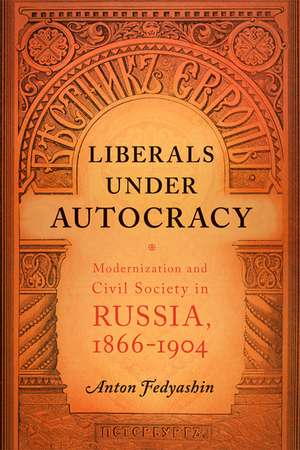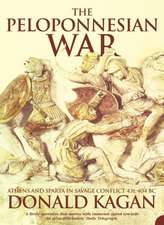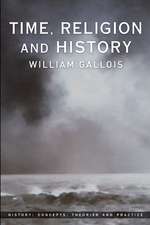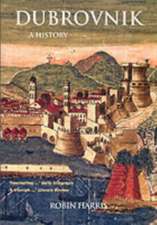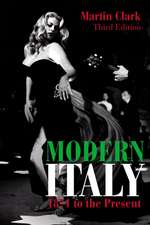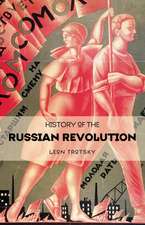Liberals under Autocracy: Modernization and Civil Society in Russia, 1866–1904
Autor Anton A. Fedyashinen Limba Engleză Paperback – 18 iun 2012
With its rocky transition to democracy, post-Soviet Russia has made observers wonder whether a moderating liberalism could ever succeed in such a land of extremes. But in Liberals under Autocracy, Anton A. Fedyashin looks back at the vibrant Russian liberalism that flourished in the country’s late imperial era, chronicling its contributions to the evolution of Russia’s rich literary culture, socioeconomic thinking, and civil society.
For five decades prior to the revolutions of 1917, The Herald of Europe (Vestnik Evropy) was the flagship journal of Russian liberalism, garnering a large readership. The journal articulated a distinctively Russian liberal agenda, one that encouraged social and economic modernization and civic participation through local self-government units (zemstvos) that defended individual rights and interests—especially those of the peasantry—in the face of increasing industrialization. Through the efforts of four men who turned The Herald into a cultural nexus in the imperial capital of St. Petersburg, the publication catalyzed the growing influence of journal culture and its formative effects on Russian politics and society.
Challenging deep-seated assumptions about Russia’s intellectual history, Fedyashin’s work casts the country’s nascent liberalism as a distinctly Russian blend of self-governance, populism, and other national, cultural traditions. As such, the book stands as a contribution to the growing literature on imperial Russia's nonrevolutionary, intellectual movements that emphasized the role of local politics in both successful modernization and the evolution of civil society in an extraparliamentary environment.
For five decades prior to the revolutions of 1917, The Herald of Europe (Vestnik Evropy) was the flagship journal of Russian liberalism, garnering a large readership. The journal articulated a distinctively Russian liberal agenda, one that encouraged social and economic modernization and civic participation through local self-government units (zemstvos) that defended individual rights and interests—especially those of the peasantry—in the face of increasing industrialization. Through the efforts of four men who turned The Herald into a cultural nexus in the imperial capital of St. Petersburg, the publication catalyzed the growing influence of journal culture and its formative effects on Russian politics and society.
Challenging deep-seated assumptions about Russia’s intellectual history, Fedyashin’s work casts the country’s nascent liberalism as a distinctly Russian blend of self-governance, populism, and other national, cultural traditions. As such, the book stands as a contribution to the growing literature on imperial Russia's nonrevolutionary, intellectual movements that emphasized the role of local politics in both successful modernization and the evolution of civil society in an extraparliamentary environment.
Preț: 232.82 lei
Nou
Puncte Express: 349
Preț estimativ în valută:
44.55€ • 46.42$ • 36.89£
44.55€ • 46.42$ • 36.89£
Carte tipărită la comandă
Livrare economică 03-17 aprilie
Preluare comenzi: 021 569.72.76
Specificații
ISBN-13: 9780299284343
ISBN-10: 0299284344
Pagini: 288
Dimensiuni: 152 x 229 x 18 mm
Greutate: 0.41 kg
Ediția:1
Editura: University of Wisconsin Press
Colecția University of Wisconsin Press
ISBN-10: 0299284344
Pagini: 288
Dimensiuni: 152 x 229 x 18 mm
Greutate: 0.41 kg
Ediția:1
Editura: University of Wisconsin Press
Colecția University of Wisconsin Press
Recenzii
“An original and valuable contribution to illuminating another of those groups in imperial Russia who lost out in the game of history, but whose legacy is strikingly apropos at present in Russia’s shaky democracy. A major contribution.”—Richard Stites, Georgetown University
“Anton Fedyashin’s Liberals under Autocracy is an important new study of Russian liberalism in a neglected period of its development. He deepens our appreciation of its characteristic humanism.”—Randall Poole, editor of Problems of Idealism: Essays in Russian Social Philosophy
“Anton Fedyashin’s book is a robust defense of a much-maligned Russian political tradition, liberalism. This is an intelligent work, well written, cogently argued, and thoroughly researched.”—Alexander Martin, editor of Kritika: Explorations in Russian and Eurasian History
“Liberals under Autocracy well integrates biography and the history of a journal with a larger history of political ideas in Russia, following the trajectory of the Herald’s liberalism through a remarkably long time period.”—European Review of History
“A clearly written, reliable, salutary and lively guide to moderate Russian liberalism . . . and also a valuable contribution to the history of late imperial Russian journalism.”—Slavonica
Notă biografică
Anton A. Fedyashin is assistant professor of history and executive director of the Initiative for Russian Culture at American University in Washington, DC.
Cuprins
Acknowledgments
Introduction
Part I: The Men of the Herald of Europe
1 Born under the Iron Tsar: Family and School
2 Formative Years: The Birth of Ideas
3 No Place for Talent: Academia and State Service
Part II: The Herald of Europe as Flagship of Russian Liberalism
4 Birth Pangs Full of Promise: The Literary Engine of Success
5 Publishing as Philanthropy: Printing and Politics
6 A Parting of Ways: The Herald of Europe and Populism
Part III: The Emergence of a Liberal Program
7 Challenging the Ideology of Progress: Russia and the Global Economy
8 Solving the Agrarian Crisis: The Famine of 1891–92 and the Zemstvo
9 From Marxist Apologetics to a Moral Economy
Conclusion
Notes
Bibliography
Index
Introduction
Part I: The Men of the Herald of Europe
1 Born under the Iron Tsar: Family and School
2 Formative Years: The Birth of Ideas
3 No Place for Talent: Academia and State Service
Part II: The Herald of Europe as Flagship of Russian Liberalism
4 Birth Pangs Full of Promise: The Literary Engine of Success
5 Publishing as Philanthropy: Printing and Politics
6 A Parting of Ways: The Herald of Europe and Populism
Part III: The Emergence of a Liberal Program
7 Challenging the Ideology of Progress: Russia and the Global Economy
8 Solving the Agrarian Crisis: The Famine of 1891–92 and the Zemstvo
9 From Marxist Apologetics to a Moral Economy
Conclusion
Notes
Bibliography
Index
Descriere
With its rocky transition to democracy, post-Soviet Russia has made observers wonder whether a moderating liberalism could ever succeed in such a land of extremes. But in Liberals under Autocracy, Anton A. Fedyashin looks back at the vibrant Russian liberalism that flourished in the country’s late imperial era, chronicling its contributions to the evolution of Russia’s rich literary culture, socioeconomic thinking, and civil society.
For five decades prior to the revolutions of 1917, The Herald of Europe (Vestnik Evropy) was the flagship journal of Russian liberalism, garnering a large readership. The journal articulated a distinctively Russian liberal agenda, one that encouraged social and economic modernization and civic participation through local self-government units (zemstvos) that defended individual rights and interests—especially those of the peasantry—in the face of increasing industrialization. Through the efforts of four men who turned The Herald into a cultural nexus in the imperial capital of St. Petersburg, the publication catalyzed the growing influence of journal culture and its formative effects on Russian politics and society.
Challenging deep-seated assumptions about Russia’s intellectual history, Fedyashin’s work casts the country’s nascent liberalism as a distinctly Russian blend of self-governance, populism, and other national, cultural traditions. As such, the book stands as a contribution to the growing literature on imperial Russia's nonrevolutionary, intellectual movements that emphasized the role of local politics in both successful modernization and the evolution of civil society in an extraparliamentary environment.
For five decades prior to the revolutions of 1917, The Herald of Europe (Vestnik Evropy) was the flagship journal of Russian liberalism, garnering a large readership. The journal articulated a distinctively Russian liberal agenda, one that encouraged social and economic modernization and civic participation through local self-government units (zemstvos) that defended individual rights and interests—especially those of the peasantry—in the face of increasing industrialization. Through the efforts of four men who turned The Herald into a cultural nexus in the imperial capital of St. Petersburg, the publication catalyzed the growing influence of journal culture and its formative effects on Russian politics and society.
Challenging deep-seated assumptions about Russia’s intellectual history, Fedyashin’s work casts the country’s nascent liberalism as a distinctly Russian blend of self-governance, populism, and other national, cultural traditions. As such, the book stands as a contribution to the growing literature on imperial Russia's nonrevolutionary, intellectual movements that emphasized the role of local politics in both successful modernization and the evolution of civil society in an extraparliamentary environment.
